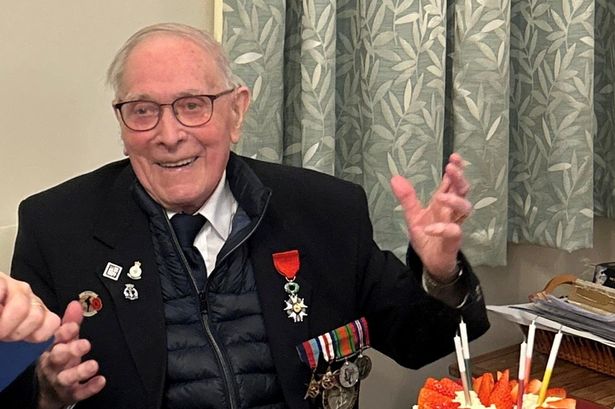Joseph Bullock, a young man barely out of his teens, found himself amidst the chaos and carnage of the Normandy landings in June 1944. At 19, an age typically associated with youthful exuberance and dreams of the future, Bullock was thrust into the harsh realities of war, witnessing firsthand the horrors of D-Day and the subsequent battles that shaped the course of World War II. While he rarely articulated the details of his experiences, his medals, proudly displayed, served as silent testaments to his bravery and contribution to the Allied victory. These decorations, earned under fire and amidst immense sacrifice, represented more than just military accolades; they symbolized a chapter in his life defined by duty, resilience, and the enduring scars of war. His family, respecting his silence, understood that these symbols spoke volumes about the profound impact of his wartime experiences.
The Normandy landings, also known as Operation Overlord, were a pivotal moment in the Second World War, marking the beginning of the liberation of Western Europe from Nazi Germany’s grip. The scale and complexity of the operation were unprecedented, involving meticulous planning, coordinated logistics, and the unwavering courage of Allied troops from various nations. The invasion involved a massive airborne assault, with paratroopers landing behind enemy lines to secure key strategic points, followed by an amphibious landing on the Normandy beaches. Bullock’s participation in this historic event placed him at the heart of a pivotal moment in history, a moment fraught with peril and uncertainty. The young soldier witnessed firsthand the intense fighting, the devastating losses, and the unwavering determination of his comrades to push forward against formidable German defenses.
The shores of Normandy on June 6, 1944, became a scene of unimaginable chaos and carnage. Under heavy enemy fire, soldiers disembarked from landing craft onto heavily defended beaches, facing a relentless barrage of bullets and artillery. The sands became stained with the blood of fallen comrades, a grim reminder of the human cost of war. Amidst this maelstrom of violence, Bullock, along with countless other young men, demonstrated extraordinary courage and resilience. The cacophony of explosions, the screams of the wounded, and the constant threat of death created an environment that would forever be etched in the memories of those who survived. The physical and psychological toll exacted by these experiences often remained hidden beneath the surface, rarely discussed, yet profoundly impacting the lives of those who endured them.
For many veterans, the memories of war remained too painful to articulate. The horrors witnessed, the loss of comrades, and the constant threat of death often left deep psychological scars. Like many of his fellow veterans, Bullock chose to remain silent about his wartime experiences, perhaps as a means of coping with the trauma or out of respect for fallen comrades. The silence surrounding these experiences, while understandable, often contributed to the difficulties veterans faced in reintegrating into civilian life. The unspoken burdens of war often manifested in various ways, sometimes impacting family relationships and contributing to the challenges of adjusting to a world far removed from the battlefields.
The medals Bullock proudly displayed served as a powerful, albeit silent, narrative of his wartime experiences. These decorations, earned through bravery and sacrifice, symbolized his contribution to the Allied victory and represented a tangible recognition of his service. Each medal held a unique significance, representing specific campaigns, acts of valor, or recognition of service rendered. They were a visible connection to a pivotal moment in history, a reminder of the sacrifices made and the battles fought. While Bullock may have chosen not to speak about his experiences, his medals spoke volumes about the man he was and the challenges he had faced.
Joseph Bullock’s story, while unique in its individual details, reflects the broader narrative of the countless young men who fought in World War II. These individuals, often barely more than boys, were thrust into the crucible of war, facing unimaginable horrors and demonstrating extraordinary courage. Many, like Bullock, carried the scars of these experiences, both visible and invisible, throughout their lives. Their collective sacrifice played a pivotal role in shaping the course of history, securing the freedoms we enjoy today. The medals they earned, often displayed with quiet pride, serve as enduring symbols of their bravery, resilience, and the profound impact of war on the lives of those who experienced it firsthand. Their stories, whether told or silently carried, deserve to be remembered and honored as a testament to the human spirit’s capacity for both courage and endurance in the face of adversity. The silence surrounding their experiences underscores the importance of understanding the lasting impact of war and the need to support those who have borne its burdens.














